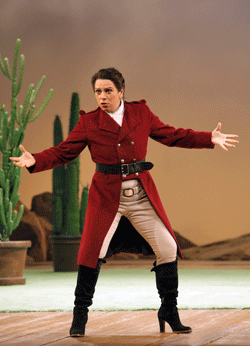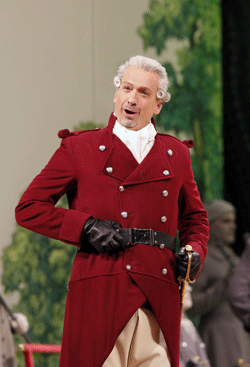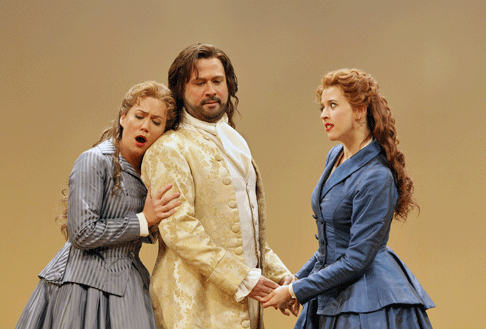25 Nov 2011
Xerxes in San Francisco
No cuts, not a single one, nearly four hours of non-stop arias, and its only hit tune happens within the first five minutes.

No cuts, not a single one, nearly four hours of non-stop arias, and its only hit tune happens within the first five minutes.
It was a fine evening in the War Memorial Opera House, a rare visit by one of opera’s greatest dramatists, G.F. Handel now 326 years-old. San Francisco Opera welcomed his 273 years-old Xerxes with a production that is 26 years-old.
 Sonia Prina as Amastris
Sonia Prina as Amastris
While the mushy acoustic of San Francisco’s venerable opera house is not kind to the linear detail and sculptural shapes of Baroque opera an exemplary cast overcame this handicap with the help of the English National Opera production directed by Nicholas Hytner and designed by David Fielding — purely and simply a classic.
The Handel revival has been going on quite a while now, in fact nearly one hundred years though not so many of his operas find their way onto the big stages to play for broader audiences. That may be the reason that when the populist and always lively ENO took on Xerxes for the Handel 1985 anniversary it choose to play up the comic elements of this opera seria, in fact to make it an outright comedy, trappings it wears quite naturally.
Impeccable comic timing and deadpan humor rarely describe performances by mezzo-soprano Susan Graham (whose roles at SFO include Iphigénie, Ariodante and Sister Helen [Dead Man Walking]). As the Persian king Serse (Xerxes) these attributes are as appropriate as the more usual phrases like impeccable musicianship and superb delivery. Her trouser acting technique does not attempt masculinity leaving us gratefully unconfused in the usual gender confusion.
 Wayne Tigges as Ariodates
Wayne Tigges as Ariodates
Almost the same things can be said about countertenor David Daniels who was her/his (Serse’s) rival in love, though in the case of Mr. Daniels the gender confusion became a part of the comedy with his maleness exaggerated by the addition of a beard — all the while singing in a male voice in a female register. Mr. Daniels has a quite beautiful falsetto that is evenly colored throughout his range, and exposes his mastery of Baroque style with every note.
To a man all the other pro- and antagonists were scene stealers. Heidi Stober and Lisette Oropesa were the sisters, Atalanta and Romilda, very lyric singers and beguiling actresses, complemented by the delightfully outraged Sonia Prina as Serse’s forgotten fiance Amastris, now disguised as a soldier. She earned a huge ovation for her dynamite, end of first act explosion “Saprà delle mie offese, ben vendicarsi il cor.”
Well, to a man it was hopeless, tormented love finally resolved by the dumb coyness of lovesick Serse aided by the very real charm of the servant Elviro sung by baritone Michael Samuel and by the pomposity of the general Ariodates adroitly served up by bass Wayne Tigges.
The greatest pleasure of the evening was however the finished staging accomplished by stage director Michael Walling. Its imposed precise movements were confidently executed by the cast. This finish alone allowed the comedy to shine as well as to expose gracefully the considerable personal charms of the seven principals. Not to mention the huge presence of 24 choristers (but only two brief choruses) and 17 tireless supernumeraries as the very slightly defined Persian society (disguised in period European dress) — totally gray, shadowy, barely visible gentle commentators on the shenanigans of Handel’s brightly dressed lovers — that added very welcome action and context to the countless arias.
David Fielding’s set on which Serse and Ariodates plot their invasion of Europe was a Baroque room with a garden superimposed (recognizing that Xerxes is really a pastorale) with a back wall that flew out to reveal some witty Middle Eastern vistas and side panels that opened to admit some monumental Persian sculpture in museum cases. Together with the cheap lawn chairs and newspapers there was plenty of nifty confusion of time and place to complement the amusing gender confusions mixed up in the silly romantic convolutions.
 Lisette Oropesa as Romilda, Michael Sumuel as Elviro and David Daniels as Arsamenes
Lisette Oropesa as Romilda, Michael Sumuel as Elviro and David Daniels as Arsamenes
Conductor Patrick Summers allowed all this to happen without imposing musical extravagances, choosing instead to indulge in his sympathy for the needs of his singers. There was no real attempt or for that matter possibility or even need to create a Baroque sound in the vast expanse of the War memorial.
This production from twenty-six years ago reflects the tastes and challenges of that time, a particularly innovative period at the ENO. A new production now of this problematic opera might attempt to underscore the depth of emotion in its exposition of these tragic (genuinely unhappy) stories. The feelings are musically quite real. The heady humor of the Hytner production kept us outside and above the much of the potential musical depth and maybe some of the pleasures of this Handel score.
Michael Milenski